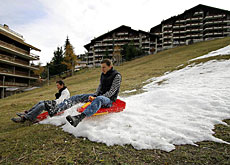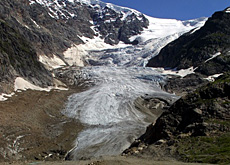Climate change threatens ski resorts in Europe

An international report warns almost half of Switzerland's ski regions are facing a lack of snow as a result of global warming.
But the Swiss have less to fear than their alpine neighbours, according to the Organisation for Economic Cooperation and Development (OECD).
“A one degree Celsius increase would reduce snow by ten per cent and plus 4°C would halve the number of snow-reliable slopes in Switzerland,” according to the report published on Wednesday.
The national tourist office, Switzerland Tourism, said it was taking the warning very seriously and a plan of action to tackle the impact of climate change was one of its top priorities next year.
It was crucial to know which regions are affected, said spokeswoman Daniela Bär.
She added many winter resort had no real alternative offers for skiers and snowboarders.
The OECD report says lower-lying ski areas in the Bernese Oberland, central and western Switzerland were likely to be the most affected.
In the future, slightly more than 50 per cent of the slopes in these regions would be naturally snow-reliable with a 300-metre rise in the snow line. The higher altitude regions in Graubünden and Valais would remain around 80 per cent snow-reliable, even if the snow line rose by 600 metres.
Ski trade
The OECD said lack of snowfall – many regions had their warmest November on record this year and late first snows – had serious repercussions for the ski trade.
Tourism in the Alps is important for the economy with 60-80 million tourists and 160 million ski days in France, Austria, Switzerland and Germany each year.
The Alps are particularly sensitive to climate change and recent warming there had been three times the global average, said the report.
Climate model projects show even greater changes in the coming decades, with less snow at low altitudes and receding glaciers and melting permafrost higher up, it added.
The study found that Germany was the most at risk, with a 1°C rise leading to a 60 per cent decrease in naturally snow-reliable areas.
Austria was slightly more sensitive than average, France about average and Italy slightly above average. Switzerland would suffer the least.
“Banks in Switzerland are refusing to lend money to ski outfits below and altitude of 1,500 metres,” said the OECD’s Shardul Agrawala, who is conducting the two-year study. “Some of the smaller operations are already closing up.”
Damaging
Ski operators have begun to adapt to the changes, though most are using technology rather than changing behaviour patterns, noted the OECD.
It warned that artificial snow may be cost effective but it consumed a lot of water and energy and affected the landscape and ecology. It may not be viable in the future, said the organisation.
Plastic sheeting over glaciers would not ultimately stop them melting away, and changing the terrain – grading the slopes and rerouting natural streams – risked damaging the environment.
“Overall, market forces are driving adaptation with more emphasis on status quo than transitions that might be economically and politically more expensive in the short-term,” said the OECD.
swissinfo with agencies
1994, 2000, 2002 and 2003 were the warmest on record in the Alps in the last 500 years, says the OECD.
Currently 90% of medium to large alpine ski areas have adequate snow cover for at least 100 days a year.
The other 10% are operating under marginal conditions.
The full report, Climate Change in the European Alps: Adapting Winter Tourism and Natural Hazard Management, will be available in February 2007.
It surveyed France, Germany, Italy, Austria and Switzerland.
The Paris-based OECD says this is the first report of its kind – a systematic cross-country study of the Alpine region covering 666 slopes.
In Switzerland low-lying areas in the Jura were excluded and only areas with at least 3km of transport facilities and 5km of ski runs were considered. This meant more higher ground areas were included.

In compliance with the JTI standards
More: SWI swissinfo.ch certified by the Journalism Trust Initiative










You can find an overview of ongoing debates with our journalists here . Please join us!
If you want to start a conversation about a topic raised in this article or want to report factual errors, email us at english@swissinfo.ch.